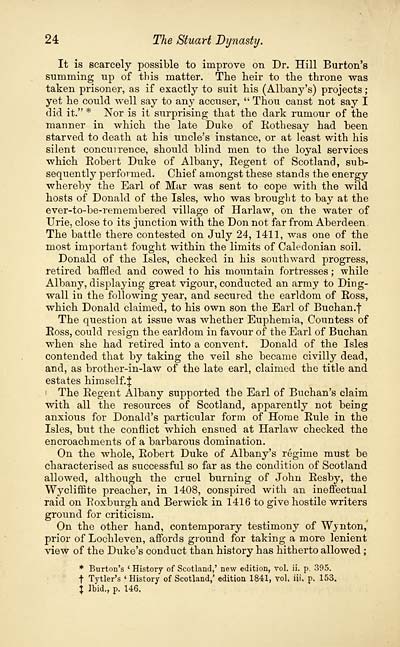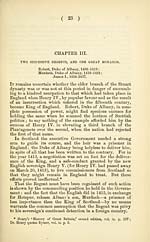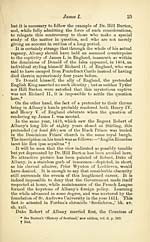Stuart dynasty
(44) Page 24
Download files
Complete book:
Individual page:
Thumbnail gallery: Grid view | List view

24 The Stuart Dynasty.
It is scarcely possible to improve on Dr. Hill Burton's
summing up of this matter. The heir to the throne was
taken prisoner, as if exactly to suit his (Albany's) projects ;
yet he could well say to any accuser, " Thou canst not say I
did it." * Nor is it surprising that the dark rumour of the
manner in which the late Duke of Eothesay had been
starved to death at his uncle's instance, or at least with his
silent concurrence, should blind men to the loyal services
which Eobert Duke of Albany, Kegent of Scotland, sub-
sequently performed. Chief amongst these stands the energy
whereby the Earl of Mar was sent to cope with the wild
hosts of Donald of the Isles, who was brought to bay at the
ever-to-be- remembered village of Harlaw, on the water of
Urie, close to its junction with the Don not far from Aberdeen .
The battle there contested on July 24, 1411, was one of the
most important fought within the limits of Caledonian soil.
Donald of the Isles, checked in his southward progress,
retired baffled and cowed to his mountain fortresses ; while
Albany, displaying great vigour, conducted an army to Ding-
wall in the following year, and secured the earldom of Eoss,
which Donald claimed, to his own son the Earl of Buchan.f
The question at issue was whether Euphemia, Countess of
Eoss, could resign the earldom in favour of the Earl of Buchan
when she had retired into a convent. Donald of the Isles
contended that by taking the veil she became civilly dead,
and, as brother-in-law of the late earl, claimed the title and
estates himself.^
i The Eegent Albany supported the Earl of Buchan's claim
with all the resources of Scotland, apparently not being
anxious for Donald's particular form of Home Eule in the
Isles, but the conflict which ensued at Harlaw checked the
encroachments of a barbarous domination.
On the whole, Eobert Duke of Albany's regime must be
characterised as successful so far as the condition of Scotland
allowed, although the cruel burning of John Eesby, the
Wycliffite preacher, in 1408, conspired with an ineffectual
raid on Eoxburgh and Berwick in 1416 to give hostile writers
ground for criticism.
On the other hand, contemporary testimony of Wynton,
prior of Lochleven, affords ground for taking a more lenient
view of the Duke's conduct than history has hitherto allowed ;
* Burton's ' History of Scotland,' new edition, vol. ii. p. 395.
t Tytler's ' History of Scotland,' edition 1841, vol. iii, p. 153.
\ Ibid., p. 146.
It is scarcely possible to improve on Dr. Hill Burton's
summing up of this matter. The heir to the throne was
taken prisoner, as if exactly to suit his (Albany's) projects ;
yet he could well say to any accuser, " Thou canst not say I
did it." * Nor is it surprising that the dark rumour of the
manner in which the late Duke of Eothesay had been
starved to death at his uncle's instance, or at least with his
silent concurrence, should blind men to the loyal services
which Eobert Duke of Albany, Kegent of Scotland, sub-
sequently performed. Chief amongst these stands the energy
whereby the Earl of Mar was sent to cope with the wild
hosts of Donald of the Isles, who was brought to bay at the
ever-to-be- remembered village of Harlaw, on the water of
Urie, close to its junction with the Don not far from Aberdeen .
The battle there contested on July 24, 1411, was one of the
most important fought within the limits of Caledonian soil.
Donald of the Isles, checked in his southward progress,
retired baffled and cowed to his mountain fortresses ; while
Albany, displaying great vigour, conducted an army to Ding-
wall in the following year, and secured the earldom of Eoss,
which Donald claimed, to his own son the Earl of Buchan.f
The question at issue was whether Euphemia, Countess of
Eoss, could resign the earldom in favour of the Earl of Buchan
when she had retired into a convent. Donald of the Isles
contended that by taking the veil she became civilly dead,
and, as brother-in-law of the late earl, claimed the title and
estates himself.^
i The Eegent Albany supported the Earl of Buchan's claim
with all the resources of Scotland, apparently not being
anxious for Donald's particular form of Home Eule in the
Isles, but the conflict which ensued at Harlaw checked the
encroachments of a barbarous domination.
On the whole, Eobert Duke of Albany's regime must be
characterised as successful so far as the condition of Scotland
allowed, although the cruel burning of John Eesby, the
Wycliffite preacher, in 1408, conspired with an ineffectual
raid on Eoxburgh and Berwick in 1416 to give hostile writers
ground for criticism.
On the other hand, contemporary testimony of Wynton,
prior of Lochleven, affords ground for taking a more lenient
view of the Duke's conduct than history has hitherto allowed ;
* Burton's ' History of Scotland,' new edition, vol. ii. p. 395.
t Tytler's ' History of Scotland,' edition 1841, vol. iii, p. 153.
\ Ibid., p. 146.
Set display mode to:
![]() Universal Viewer |
Universal Viewer | ![]() Mirador |
Large image | Transcription
Mirador |
Large image | Transcription
Images and transcriptions on this page, including medium image downloads, may be used under the Creative Commons Attribution 4.0 International Licence unless otherwise stated. ![]()
| Histories of Scottish families > Stuart dynasty > (44) Page 24 |
|---|
| Permanent URL | https://digital.nls.uk/94818294 |
|---|
| Description | A selection of almost 400 printed items relating to the history of Scottish families, mostly dating from the 19th and early 20th centuries. Includes memoirs, genealogies and clan histories, with a few produced by emigrant families. The earliest family history goes back to AD 916. |
|---|

